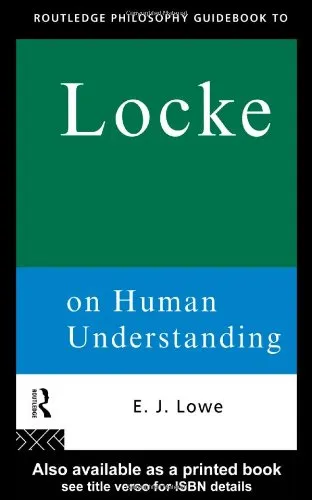Routledge Philosophy Guidebook to Locke on Human Understanding (Routledge Philosophy GuideBooks)
4.3
بر اساس نظر کاربران

شما میتونید سوالاتتون در باره کتاب رو از هوش مصنوعیش بعد از ورود بپرسید
هر دانلود یا پرسش از هوش مصنوعی 2 امتیاز لازم دارد، برای بدست آوردن امتیاز رایگان، به صفحه ی راهنمای امتیازات سر بزنید و یک سری کار ارزشمند انجام بدینکتاب های مرتبط:
John Locke was without a doubt one of the sanest and soberest souls ever to put pen to paper. Here philosopher Jonathan Lowe provides a fine and thorough introduction to Locke's greatest and most influential work: his _Essay Concerning Human Understanding_.Lowe not only provides clear and sound explications of Locke's own views, carefully placing them into historical context, but also inquires into whether Locke's views can be defended today -- and, perhaps surprisingly, finds that many of them are defensible though perhaps in need of modification. And Lowe does not hesitate to add his own views where necessary, by way of suggesting how a modern follower of Locke might carry his philosophy forward in light of scientific developments since Locke's day.The result is more than an introduction to Locke -- it is a scintillating volume that will be a pleasurable read even for longtime readers of Locke. Lowe has a knack for picking out the most interesting features of Locke's thought and presenting them in a new light.For example, I was quite struck by Lowe's remarks on Locke's "particularist" (Lowe's term) view of logic. Locke, as his readers may know, was extremely critical of syllogistic formalism, holding that while reasoned arguments may indeed be put in syllogistic form, it was nevertheless ridiculous to maintain that the use of the form itself is what gives validity to an argument. As Locke famously remarked, God was not so sparing as to make men barely two-legged and leave it to Aristotle to make them rational.Lowe trenchantly notes that Locke's critiques would apply equally well to the Frege-Russell variety of formal logic; Locke, very much like Brand Blanshard in _Reason and Analysis_, held that we reason by connecting terms through their _meanings_, which a strictly formal logic provides no way to do.Lowe's remarks on this point are food for thought not only on the matter of formal logic but on the question of what allegedly divides "rationalism" from "empiricism." Elsewhere in this volume, Lowe suggests that the firm distinction between these allegedly opposite schools of thought cannot be made out; and Locke was quite clearly a rationalist as regards knowledge even if he believed we arrived at all of our our ideas "empirically." That is, Locke clearly still has something to say to the rationalist philosophers of our own day -- and through Lowe, he says it.And says it well: it is very much to Lowe's credit that, through his own lucid prose, he has allowed Locke to speak so clearly. The reader of this excellent introduction will find Locke to be fine intellectual company -- and also Lowe, a clear thinker and graceful writer whose own admiration for Locke is never explicitly stated but is nevertheless obvious through the keen sympathy of his presentation.All in all, then, a delightful volume very much in the Lockean spirit.
دانلود رایگان مستقیم
شما میتونید سوالاتتون در باره کتاب رو از هوش مصنوعیش بعد از ورود بپرسید
دسترسی به کتابها از طریق پلتفرمهای قانونی و کتابخانههای عمومی نه تنها از حقوق نویسندگان و ناشران حمایت میکند، بلکه به پایداری فرهنگ کتابخوانی نیز کمک میرساند. پیش از دانلود، لحظهای به بررسی این گزینهها فکر کنید.
این کتاب رو در پلتفرم های دیگه ببینید
WorldCat به شما کمک میکنه تا کتاب ها رو در کتابخانه های سراسر دنیا پیدا کنید
امتیازها، نظرات تخصصی و صحبت ها درباره کتاب را در Goodreads ببینید
کتابهای کمیاب یا دست دوم را در AbeBooks پیدا کنید و بخرید
1246
بازدید4.3
امتیاز50
نظر98%
رضایتنظرات:
4.3
بر اساس 0 نظر کاربران
"کیفیت چاپ عالی بود، خیلی راضیام"
⭐⭐⭐⭐⭐
Questions & Answers
Ask questions about this book or help others by answering
Please وارد شوید to ask a question
No questions yet. Be the first to ask!



